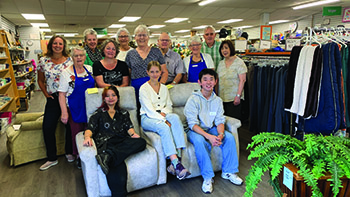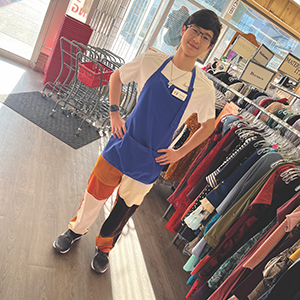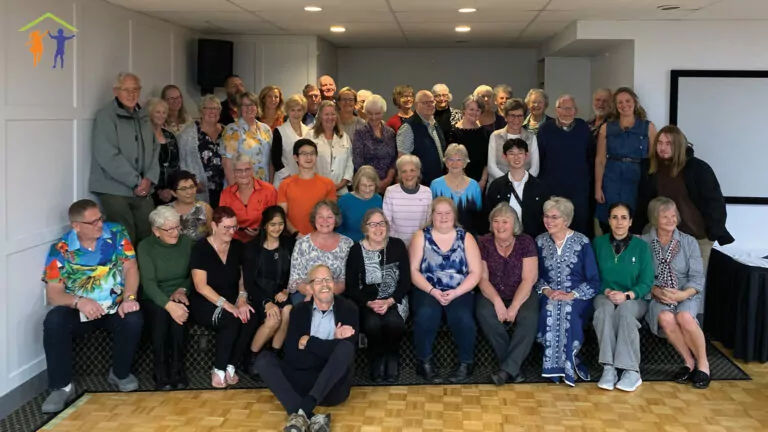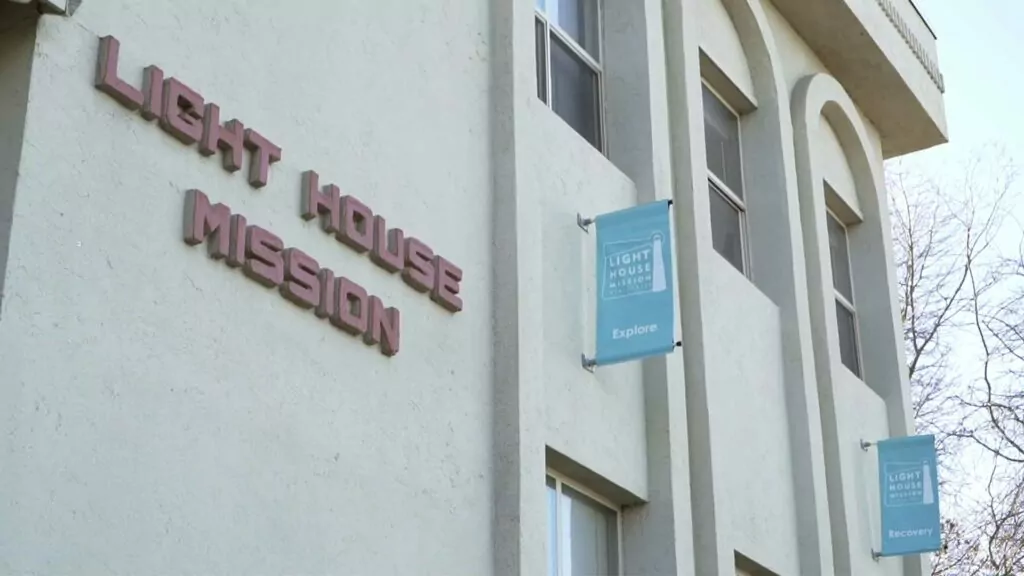In his “science of happiness” class at Harvard Business School, Arthur Brooks teaches that of the five things you can do with money, four could make you happy. What are these four, and what’s the fifth one that can’t bring joy? As Brooks explained on The Ramsey Show:
“You can buy experiences, you can buy time, you can give it away, or you can save it…. [But] your brain is telling you to do the one thing that won’t bring happiness, which is to go buy stuff.”
Although Brooks is generally correct, a recent visit to the Hope for Children Thrift Store in Langley, BC, taught me that there is an important exception. There I experienced how buying and selling “stuff” can bring more than happiness. It can bring hope.
That isn’t because it is a bargain, regardless of how much that may make our heart sing at the till. Rather, it is because of the people and mission that drive the store. Peel away the surface and you discover that by buying “stuff” at this thrift store, you end up accomplishing all the other ways that Brooks says your money can buy happiness: buying experiences and time, saving, and giving things away. In other words, this thrift store reveals the secret to how our “stuff” can be used to bring lasting hope and joy.
Saving a dollar
Taking a few steps into the thrift store, the first thing I noticed was people. Everywhere. The place was hopping. Customers were swarming the clothing racks and the till. I watched as one lady, who appeared to be homeless, asked the volunteer at the till to show her a piece of jewellery that caught her eye in the display case. The item was only a dollar or two, and the would-be buyer was eager to try it on.
The store wasn’t entirely new to me. My mother-in-law has volunteered here for years and, when we visit the area, my family frequently shops at the store. Even when we aren’t in the area, my mother-in-law often has a list of items to keep an eye out for – things our family needs, like a pair of boys’ running shoes, or winter mitts.
Coming from a family of ten, I was raised on thrift store finds, and I became a thrift shopper myself when I moved out of the home and attended university. I have grown to love thrift stores, not just because of the cost-savings, but also because they accomplish so much more. That is why I went to Hope for Children – to pull the curtain back on the side to thrifting that so many don’t see.
Saving vulnerable children
I turned away from the till to be greeted by the store’s bright-eyed manager, Fiona Jansen. She took me to the one small place in the building where there wasn’t a bustle: the volunteers’ coffee room.
Jansen explained why the thrift store was first started 10 years ago. About 17 years ago, Jeremy VanBeelen and Duane Visscher, two young men from the local Reformed community, had traveled to an orphanage in Mexico for a short-term mission project. The work pulled on their hearts so much that they stayed, devoting their lives to the orphanages. “We had a couple of families connected to the ministries that were serving in Mexico,” Jansen explained. “The thrift store is a really great way to raise money…and so people got excited.” With the help of some people who had experience running a thrift store, a core group got “Hope for Children Thrift Store” off the ground. The store was named after the organization overseeing the orphanages in Mexico.
Indeed, the thrift store has been a great way to raise money. Around seven years in, they had raised over a million dollars for Children of Hope, and the total is now well over $1.2 million today.
“We don’t support any day-to-day [expenses] or salaries… because if something were to go wrong, all of a sudden the children couldn’t eat or a family wouldn’t get their salary.” Instead, they fund infrastructure projects, including dorms, solar panels, vehicles, and security walls at the nine orphanages and soup kitchens in Mexico.
Jansen was able to witness the impact of the support first-hand, joining a tour of the orphanages.
“I went as the thrift store representative, and then we toured all the different ministries that we were supporting. That Sunday we had a service at Pan de Vida and I was sitting beside a Mexican lady. I didn’t know her, and I couldn’t speak with her, but afterwards they introduced us. ‘These are the members of the board from Children of Hope, and this is Fiona. She’s from Hope for Children, the thrift store,’ and this lady turned to me, and she was just crying. And she’s [saying], thank you, thank you.
“It was quite amazing to see the gratitude, and then to see the good things that are going on there. God is doing amazing things there, and to hear the stories of the children: what they’ve been rescued from, how they’re growing, and that they’re safe and learning about the Lord. It’s amazing.”
The joy of meaningful work

Some of the crew from a typical Thursday morning.
The thrift store blessings don’t end with the recipients of the money. It extends to over 80 volunteers who keep the store running.
Jansen explained that they welcome volunteers from all walks of life, from high school students looking for volunteer hours on their resume, to adults who are seeking community and a chance to make a difference, and seniors who are eager to bless others with the skills and experience that God has given them through their lives. A core group of these volunteers has served with Hope for Children since its beginning.
One of these volunteers is Jake Bredenhof, who stepped into the coffee room while Jansen and I were meeting. Bredenhof started working at the thrift store in 2015, as he was in the process of selling the family’s chicken farm in the neighboring community of Cloverdale. Although Jake and his wife Lee later moved to Abbotsford, they both are happy to make the 25-minute commute to continue serving at the store.
Jake works in the back, where new donations arrive. “Every day is a little bit like Christmas because you don’t know what is in the next box,” he explained. He sorts the books, jewelry, bedding, clothes, appliances, and is “basically the front-runner of all the donations that come in.” “You meet a lot of really nice people, who have been donating to the store for years already.”
Jake and Lee aren’t the exception in his congregation, the Aldergrove Canadian Reformed Church, which has over 60 seniors. Some drive for the Cancer Society, others for Meals on Wheels, and others volunteer at the local food bank and other thrift stores closer to Abbotsford. “It is a stewardly way of giving back to the community,” he reflected.
Jansen also pointed to a picture of a lady on the bulletin board of the coffee room, who recently passed away. “She was 80, and she was feeling blue, and her doctor said ‘you need to find something to keep you busy.’’’ The answer was right around the corner. “She was walking home from the doctor’s office, and she saw this store, and she said ‘they do things to help kids. I love kids. I’m going to see if I can volunteer.’ She volunteered here till she died.”
I asked Jansen if there was anything surprising that she’d learned working at the store.
“I would say that I gained a whole new understanding of age. So many of my volunteers are well into their 70’s and even 80’s and yet here they are working hard and loving it. Retirement doesn’t mean sitting on a rocking chair and watching the world go by. I have been amazed at how active and selfless volunteers are, at any age.”
Jansen also shared that some of their volunteers aren’t Christians, though they open the day with devotions. “But most of the time people sit there and participate, and we’ve had positive things come from that too.” She gave the example of a girl who had drifted away from church but, through the fellowship at the thrift store, came back and was baptized. Bredenhof noted that allowing non-Christians to volunteer has “never been a problem.”
When I asked Jansen what in particular the volunteers enjoyed about serving at the thrift store, she shared that some simply enjoy interacting with the community, being able to hear the stories of those who come in and even being able to share the Gospel with them. “People love to tell them about where the money’s going, and then they can share stories about what’s going on in Mexico.”

A volunteer wearing very cool thrifted pants.
“When I was in need you fed Me and clothed Me”
The thrift store doesn’t just provide for the needs of those in Mexico. The clothing and used goods provide critical relief for those in need in their own community of Langley, including some of the homeless who frequent the store.
“At certain times of the month they are coming and paying, and other times of the month they’re not. There are times when people will ask [for free clothing] and I will always say yes.” Jansen also explained that for those who ask frequently, she will only provide free clothing once a month.
“I’ve had a woman come, and she says ‘I have to go to court. I have nothing. Can I have an outfit?’ We gave her an outfit.”
In addition to the clothing and merchandise, the thrift store has a shelf with free food.
“We have a guy who started on his own [initiative] picking up food. I think he saw it getting chucked at Safeway. So now he goes to a few different places every day, and then he brings it to us, and then we put it out on our free shelf.”
Because of the free food, every day there is a lineup outside the door, waiting for the store to open.
That said, Jansen explained that the majority of the shoppers aren’t in that kind of need. “We get a lot of crafters who come specifically for our crafting department because we have an exceptional craft department for our thrift store.” To add to this, “we get young people who are just out having a good time together with their friends.” Overall, there aren’t as many low-income people as she expected.
Lasting hope
Arthur Brooks is correct that “buying stuff” generally won’t bring happiness. God made us with hearts, souls, and minds, all of which were made for so much more than consumption. We were made to experience fellowship with God and our neighbors. My visit reminded me how that is exactly what Hope for Children, and so many other thrift stores, accomplish. Stuff fades and eventually is thrown out. But the relationships forged through service and generosity abide eternally.
So, if you want to buy happiness, visit your local thrift store.
Pictures graciously provide by Fiona Jansen.












